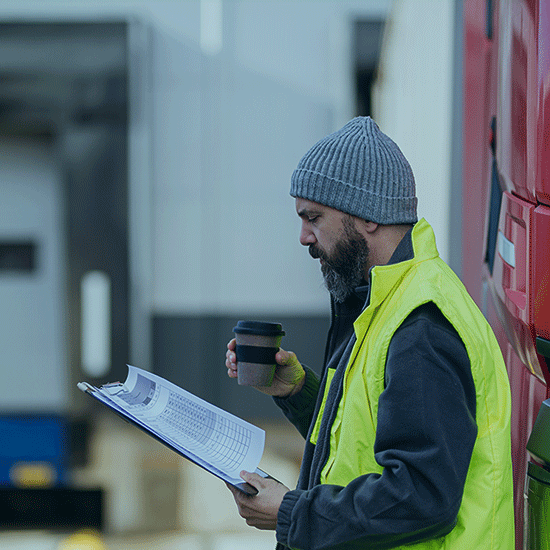Just like the companies they work for, commercial drivers must deal with their own logistics. Handling personal matters while on the road can be a major hassle, especially with Hours of Service (HOS) rules that limit drive time. Personal conveyance (PC) is a helpful off-duty tool that helps drivers maximize their time on the road while still staying compliant with regulations.
In this blog, we will discuss the rules that govern personal conveyance and what best practices for both drivers and fleets.
What is Personal Conveyance (PC)?
Personal conveyance refers to any time a driver uses a commercial motor vehicle (CMV) for personal use while off-duty. PC essentially allows drivers to use company vehicles while attending to personal matters without affecting their HOS, but there are specific limitations around these guidelines, as outlined by the Federal Motor Carrier Safety Administration (FMCSA).
According to the FMCSA, “A driver may record time operating a CMV for personal conveyance as off-duty only when the driver is relieved from work and all responsibility for performing work by the motor carrier.” The FMCSA also makes it clear that personal conveyance can not benefit the company financially.
Let’s take a closer look at these rules and examine how the FMSCA defines qualifying PC activities.
FMCSA Rules for Personal Conveyance
Most of the FMCSA rules and guidance on personal conveyance center around off-duty status rather than load status. This means that even if the vehicle is carrying a load, a driver can still use it for PC as long as they are finished working and using the vehicle strictly for personal reasons. In other words, it’s the nature of the movement, not the vehicle’s load, that determines PC eligibility.
Additionally, drivers must properly document when they are using vehicles for personal conveyance and must also understand that it does not reduce their responsibility to operate a CMV safely. Essentially, any rules that apply while on duty still apply when a driver is behind the wheel while off duty.
So, does all off-duty driving count as personal conveyance? Ah, if only it were that simple.
When Personal Conveyance is Allowed
Some activities that qualify as personal conveyance per FMSCA include:
- Traveling from the driver’s lodging (like a motel or truck stop) to restaurants and entertainment facilities.
- Commuting between the driver’s terminal and their residence, between trailer-drop lots and the driver’s residence, and between work sites and their residence.
- NOTE: The driver must still have enough time for adequate rest between shifts, even when using the CMV to commute.
- Traveling to a nearby, reasonable, safe location to obtain required rest after loading or unloading.
- NOTE: The resting location must be the first reasonably available location, and the driver must still have enough time for adequate rest before returning to on-duty driving.
- Moving a CMV at the request of a safety official during the driver’s off-duty time.
- Transporting personal property while off-duty.
- Authorized use of a CMV to travel home after working at an offsite location.
When Personal Conveyance is NOT Allowed
Activities that do not meet FMCSA’s personal conveyance eligibility include:
- Moving a CMV to enhance the operational readiness of a motor carrier. This would include things like bypassing the closest resting location to get closer to a loading or unloading site.
- Bobtailing or hauling an empty trailer to retrieve another load or repositioning a vehicle in preparation for its next trip.
- Driving a passenger-carrying CMV while passengers are on board.
- Transporting a vehicle to a facility for maintenance or repairs.
- Driving to a resting location after being placed out of service (unless directed by an enforcement officer at the scene).
- Traveling to a motor carrier’s terminal after loading or unloading from a shipper or a receiver.
It is important to note that this is not a comprehensive list—always refer to FMSCA guidelines for the most up-to-date information on personal conveyance.
Personal Conveyance FAQ’s
By now, we know that not all off-duty driving qualifies as personal conveyance, but there are other misconceptions and nuances around PC to be aware of as well.
Are there federal mileage or time limits on personal conveyance?
Not officially, but there are still restrictions around driving fatigued that overrule any PC eligibility. If an enforcement officer finds a driver to be driving while fatigued or ill, they can issue violations regardless of PC status.
Additionally, individual carriers and fleets often enforce stricter PC policies than FMCSA does (more on that later).
Can personal conveyance be used to extend HOS?
No. PC is strictly limited to off-duty status, so it’s crucial that drivers understand the distinction between personal use and disqualifying activities (like any that benefit carrier operations).
Can personal conveyance be used for repositioning assets for business purposes?
No. This is considered an activity that “enhances the operational readiness of a motor carrier” and is not allowed as PC.
What happens if I violate personal conveyance regulations?
Misuse of PC status can result in a DOT violation, as well as potential fines and audits. Like many DOT violations, repeated offenses can lead to suspension of operating authority.
Best Practices for Fleet Personal Conveyance Policies
When it comes to compliance, fleets have the ability to enforce stricter personal conveyance policies than FMCSA regulations do. Carriers and fleets can establish PC limitations or even ban the use of their vehicles for personal use altogether. Some fleets impose distance limitations or prohibit personal conveyance while the vehicle is loaded. Many carriers require drivers to call their dispatcher and receive permission before moving into PC status.
How a company handles personal conveyance is a matter of choice, but fleet managers should consider things like insurance liability, mileage, driver experience, and resources needed to monitor and manage PC policies. For some fleets, offering drivers flexibility in their on-the-road experience is a priority, while others may not want to shoulder the additional risk.
The Role of ELDs in Fleet Personal Conveyance Policies
Regardless of how a fleet approaches personal conveyance, electronic logging devices (ELDs) are a critical tool for managing and enforcing policies. Many ELDs include personal conveyance status tracking so drivers can easily document their record of duty status, which is then uploaded to a fleet management system. Fleets can configure ELDs to flag or automatically restrict improper PC use, effectively enforcing policies with little to no oversight.
Managing PC & HOS Compliance with Solera Fleet Solutions
Ensuring compliance with personal conveyance and HOS rules requires the right technology to monitor, enforce, and optimize fleet policies. Solera Fleet Solutions provides a complete suite of compliance and safety tools to help fleets stay ahead of evolving regulations while keeping drivers productive.
- Electronic Logging Devices: FMCSA-compliant ELDs automatically track PC status and HOS, reducing the risk of violations. Fleets can configure restrictions to prevent misuse and ensure accurate duty status records.
- AI-Powered Telematics: Advanced telematics and data-driven insights help fleet managers identify risky driving patterns and improve overall compliance strategies.
- Video-Based Safety Monitoring: AI-enabled https://www.omnitracs.com/blog/semi-truck-dash-cams-the-best-options-for-your-fleet provide real-time visibility into driver behavior, helping fleets prevent distracted or fatigued driving—whether on duty or off duty.
Take control of your fleet’s compliance strategy today. Contact Solera Fleet Solutions for a consultation and discover how our technology can help you enforce HOS compliance for optimal fleet performance.



